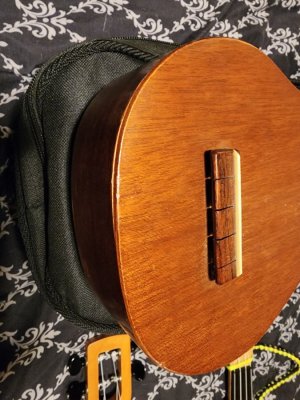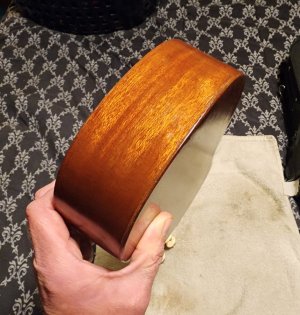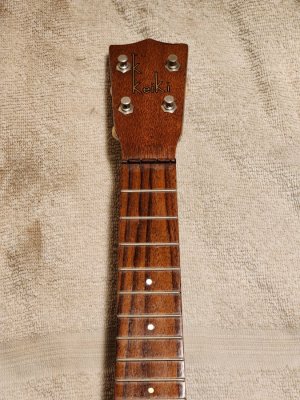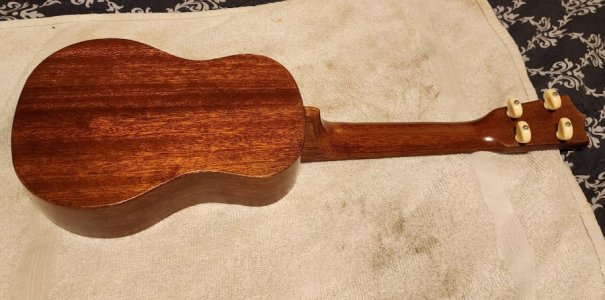Hello.
I acquired a 1969 Kamaka Keiki that needs some repair. The ukulele seems to be in excellent condition as far as cracks and even general wear, however it has some seems that have came apart and the neck is going to need to be reset. The heat and humidity were not kind to it's glue. I think it had the same strings it came from Hawaii with, they are stiff as a board.
I cleaned it up and have it setting in good humidity. I dont plan to restring it till i have it repaired. Please for give the nasty towel the uke is on. Lol
The uke was purchased in 1969 in Hawaii and used for lessons as a child. It was just stored in a closet once the owner moved to the Mainland. (I am not certain of how long ago that was).
There are a few places where the seems between the back or soundboard and the sides have came loose. Shown in pics as best I can. The neck is also pulling up at the heel some so it will need pulled off and reset also.
Everything else appears to be in amazing condition. The bridge is solid and I can see no signs of movement. The tuners are smooth and work well, though I plan to disassemble and clean.
I am new to ukuleles but a long-time woodworker and I have interest in learning how to rebuild and build ukes. I am considering doing this work myself on this uke but wanted to reachout to the community to get reactions from some experienced luthiers. Especially anyone with direct experience on this particular style uke. I feel the neck removal and reset would be fairly straightforward as well as separating and regluing the seems of the body. If you know of any particular difficulties with this style of uke I would appreciate a heads up.
I am not exactly sure of the value of this uke though I assumed not extremely high or anything. I know these were made from 1963-70 in Japan and the final finishing done in Hawaii. If this is a uke worth sending to an experienced luthier for a rebuild, please let me know. I believe I can accomplish the repairs with professional results but just want to make sure that this one was a good one to practice on before I make the leap.
Any help or constructive criticism is welcome and appreciated.
I acquired a 1969 Kamaka Keiki that needs some repair. The ukulele seems to be in excellent condition as far as cracks and even general wear, however it has some seems that have came apart and the neck is going to need to be reset. The heat and humidity were not kind to it's glue. I think it had the same strings it came from Hawaii with, they are stiff as a board.
I cleaned it up and have it setting in good humidity. I dont plan to restring it till i have it repaired. Please for give the nasty towel the uke is on. Lol
The uke was purchased in 1969 in Hawaii and used for lessons as a child. It was just stored in a closet once the owner moved to the Mainland. (I am not certain of how long ago that was).
There are a few places where the seems between the back or soundboard and the sides have came loose. Shown in pics as best I can. The neck is also pulling up at the heel some so it will need pulled off and reset also.
Everything else appears to be in amazing condition. The bridge is solid and I can see no signs of movement. The tuners are smooth and work well, though I plan to disassemble and clean.
I am new to ukuleles but a long-time woodworker and I have interest in learning how to rebuild and build ukes. I am considering doing this work myself on this uke but wanted to reachout to the community to get reactions from some experienced luthiers. Especially anyone with direct experience on this particular style uke. I feel the neck removal and reset would be fairly straightforward as well as separating and regluing the seems of the body. If you know of any particular difficulties with this style of uke I would appreciate a heads up.
I am not exactly sure of the value of this uke though I assumed not extremely high or anything. I know these were made from 1963-70 in Japan and the final finishing done in Hawaii. If this is a uke worth sending to an experienced luthier for a rebuild, please let me know. I believe I can accomplish the repairs with professional results but just want to make sure that this one was a good one to practice on before I make the leap.
Any help or constructive criticism is welcome and appreciated.













